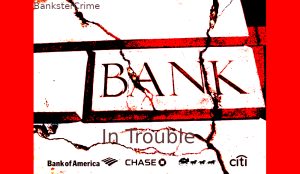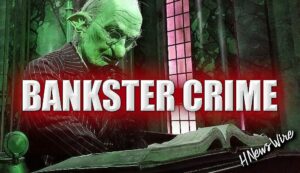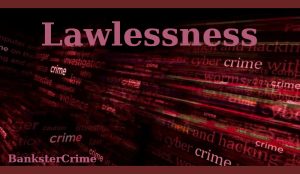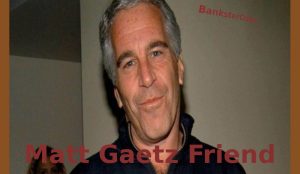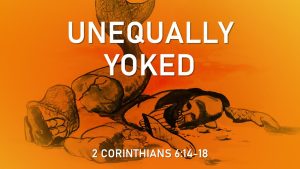Banks are in a state of “Greed and Corruption” a state of decay, pollution, or incorrectness. Corruption is one of the effects of sin that resulted from the fall of man. Corruption in the Bible is the state of moral contamination and spiritual decay expressed through disobedience toward God. SRH…
Corruption is closely related to spiritual death. God told Adam that, if he ate from the tree of the knowledge of good and evil, he would “surely die” (Genesis 2:17). Adam didn’t die a physical death that day but a spiritual one that involved separation from God (Ephesians 2:1–3).
On September 25, 2013, after spending five years and 7,000 hours using taxpayers’ money investigating the potential rigging of the silver market, the Commodity Futures Trading Commission (CFTC) concluded that “there is not a viable basis to bring an enforcement action with respect to any firm or its employees related to our investigation of silver markets.” The investigation was provoked by multiple complaints asserting the market was rigged.
The CFTC is a Federal regulator that oversees the U.S. commodities markets. The U.S. Department of Justice (DOJ) is also a Federal agency and the only one that can bring a criminal case against firms and individuals who commit conspiracy and fraud in commodity and securities markets. (The Securities and Exchange Commission can bring only civil, not criminal, cases.)
On October 9 of last year, the DOJ used its criminal powers and charged John Edmonds, a former long-time employee of JPMorgan Chase, with one count of commodities fraud and one count of conspiracy to commit wire fraud, commodities fraud, commodities price manipulation, and spoofing.
The charges covered the period in which the CFTC had found no “viable basis to bring an enforcement action” for silver market manipulation.
Edmonds has pleaded guilty to the charges and admitted that “from approximately 2009 through 2015, he conspired with other precious metals traders at the Bank to manipulate the markets for gold, silver, platinum and palladium futures contracts traded on the New York Mercantile Exchange Inc. (NYMEX) and Commodity Exchange Inc. (COMEX)….”
In one specific example involving the silver market, Edmonds admitted to the following:
“As one example of this deceptive trading strategy, on or about October 12, 2012, at approximately 1:08:48.831 p.m. (Central Daylight Time), the defendant placed an order to sell 402 silver futures contracts at the per-contract price of $33.610 with the intent to cancel the order before execution. The purpose of this Spoof Order was to induce other market participants to trade against the defendant’s opposite side order to buy silver futures contracts, which order the defendant did want to execute. The defendant’s Spoof Order did, in fact, cause other market participants to react and trade at prices, quantities, and times that they otherwise would not have traded, but for the defendant’s Spoof Order, including a precious metals trader in Connecticut who sold a single silver futures contract at 1:08:48.837 p.m. at the price of $33.585.”
The CFTC’s fruitless 5-year investigation is all the more embarrassing because Edmonds was not some lone, rogue trader inside an otherwise pristine Wall Street bank. JPMorgan’s reputation is so soiled for rigging everything from electric markets to foreign exchange to wearing a self-imposed blindfold while Bernie Madoff carried out his decades-long Ponzi scheme that two trial attorneys have written a book comparing the bank to the Gambino crime family. (The reality is that it would take a 7,000-hour study just to chronicle this bank’s serial crimes. See our partial rap sheet here.)
Far from being alone, rogue trader, Edmonds has now implicated other traders and supervisors within JPMorgan Chase. His plea agreement indicates the following:
“…the defendant and his fellow traders routinely placed bids and offers-in other words, orders-for precious metals futures contracts with the intent to cancel those bids and offers before execution (the ‘Spoof Orders’). This trading strategy was intended to, and did, transmit materially false and misleading liquidity and price information and otherwise deceive other market participants about the existence of supply and demand for the futures contracts at issue, and thus induce those other market participants to trade against orders that the defendant and his co-conspirators placed and did want to execute on the opposite side of the market from the Spoof Orders at prices, quantities, and times that the other market participants otherwise would not have traded. The Spoof Orders thus were designed to, and did, artificially move the price of precious metals futures contracts in a direction that was favorable to the defendant and his co-conspirators at the Bank, to the detriment of other market participants, including other market participants in Connecticut. The defendant placed the Spoof Orders in order to make money and avoid losses for himself, his co-conspirators, and the Bank. The defendant learned this deceptive trading strategy from more senior traders at the Bank, and he personally deployed this strategy hundreds of times with the knowledge and consent of his immediate supervisors.”
Making this case all the more interesting is the fact that JPMorgan Chase is still under probation in its own plea agreement for its role in rigging the foreign exchange market. It entered into that plea agreement on May 20, 2015, but a Federal District court did not approve the deal until 2017. This means that its three-year probation period does not end until January 2020. JPMorgan Chase agreed to one criminal felony count in that matter and agreed to two criminal felony counts in the Madoff matter in 2014.
JPMorgan Chase has acknowledged in its own 10-K filing with the SEC that it remains on probation, writing as follows:
“The Firm previously reported settlements with certain government authorities relating to its foreign exchange (‘FX’) sales and trading activities and controls related to those activities. FX-related investigations and inquiries by government authorities, including competition authorities, are ongoing, and the Firm is cooperating with and working to resolve those matters. In May 2015, the Firm pleaded guilty to a single violation of federal antitrust law. In January 2017, the Firm was sentenced, with judgment entered thereafter and a term of probation ending in January 2020.”
As part of its plea agreement, JPMorgan Chase agreed to “not commit another crime in violation of the federal laws of the United States” during the term of probation. It also agreed to the following:
“The defendant understands that during the term of probation it shall: (1) report to the Antitrust Division all credible information regarding criminal violations of U.S. antitrust laws by the defendant or any of its employees as to which the defendant’s Board of Directors, management (that is, all supervisors within the bank), or legal and compliance personnel are aware; and (2) report to the Criminal Division, Fraud Section all credible information regarding criminal violations of U.S. law concerning fraud, including securities or commodities fraud by the defendant or any of its employees as to which the defendant’s Board of Directors, management (that is, all supervisors within the bank), or legal and compliance personnel are aware.”
JPMorgan Chase has admitted in its February 10-K filing with the SEC that it’s under a criminal investigation by the DOJ relating to the precious metals market, writing that “Various authorities, including the Department of Justice’s Criminal Division, are conducting investigations relating to trading practices in the precious metals markets and related conduct.”
Raising suspicions that this investigation against the bank is serious is the fact that the DOJ has twice postponed the criminal sentencing of Edmonds, suggesting he continues to cooperate in providing evidence in the investigation. Sentencing is now scheduled for December. All motions pertaining to that matter are under seal.
Career prosecutors in the Department of Justice and Federal judges tend to take a dim view of recidivist Wall Street banks. It is also relevant that the same Chairman and CEO, Jamie Dimon, has been allowed by the Board of Directors to remain at the helm of the bank through two probation periods, two deferred prosecution agreements, three criminal felony counts and $36 billion in fines. And, by the way, those three criminal felony counts that occurred under Dimon are three more than the bank received during its prior 100 years of existence. Source
The case is 3:18-cr-00239-RNC, the USA v. Edmonds, and is being conducted in the U.S. District Court for the District of Connecticut.
By the time of Noah, the corruption of mankind had been amplified: “Now the earth was corrupt in God’s sight and was full of violence. God saw how corrupt the earth had become, for all the people on earth had corrupted their ways” (Genesis 6:11–12).
The Bible describes sinful humanity as corrupt: “The fool says in his heart, ‘There is no God.’ They are corrupt, their deeds are vile; there is no one who does good. The LORD looks down from heaven on all mankind to see if there are any who understand, any who seek God. All have turned away, all have become corrupt; there is no one who does good, not even one (Psalm 14:1–3; see also Psalm 53:1–3; Isaiah 1:4).
In the Old Testament, corruption can refer to literal, physical decay (Job 17:14; Psalm 16:10), but, most often, corruption is used figuratively for moral corruption and depravity (Exodus 32:7; Hosea 9:9). The prophets boldly took a stand against moral decay among God’s people: “The sin of the house of Israel and Judah is extremely great; the land is full of murder, and the city is full of corruption” (Ezekiel 9:9, NET).
StevieRay Hansen
Editor, Bankster Crime
MY MISSION IS NOT TO CONVINCE YOU, ONLY TO INFORM…
#Fraud #Banks #Money #Corruption #Bankers

![]()
